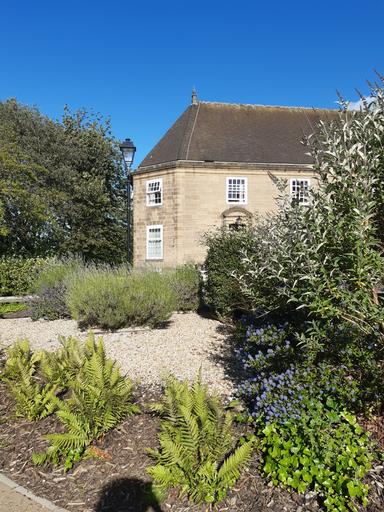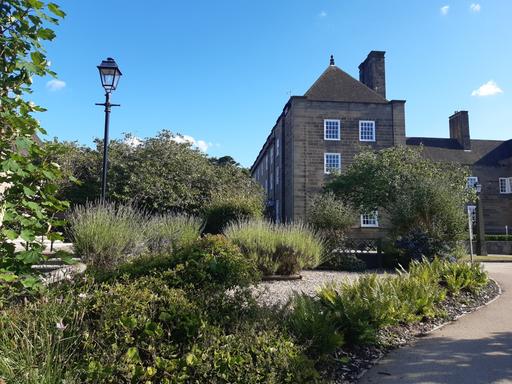
5 minute read
David Saddington
AN INTERVIEW WITH DAVID SADDINGTON
E L S I E L E W I S T A L K S T O D A V I D S A D D I N G T O N A B O U T H I S T I M E A T M A R Y ' S A N D T H E E N V I R O N M E N T A L W O R K H E H A S D O N E S I N C E .
Many Marians enjoy sitting in the eco garden outside Fergusson. It has become a space of sanctity for students. We interviewed David Saddington, the founder of the eco garden, about his time at Mary ’ s and his environmental work since leaving university.
Former Mary ’ s student David Saddington has pursued a career in environmental campaigning. His latest course of action was the nature campaign for COP26, which was held in Glasgow in November 2021. David describes the summit as a critical moment for climate action, particularly in the context of emerging from the pandemic to step up the ambition of tackling climate change.
The nature campaign aims to reduce emissions; a lot of the focus for this was on target setting, asking countries to come back to Glasgow with more ambitious pledges than they had in the Paris Agreement, 2015. David says that 6 years on from Paris, we still need to reduce the emissions gap and devise new targets as we are not on track to meet the Paris Agreement target of 1.5 degrees. The nature campaign was a new idea for COP, and is part of the UK’ s aim for real economy change to start imminently cutting emissions. The nature campaign looks at really specific interventions to identify specific problems. One of the specific aims of the nature campaign was the aim to halt and reverse forest loss by 2030. David says that when looking at where to cut emissions, a stronger focus needs to be placed on the numbers, as we need to not reduce global emissions by 2%; we need to get to net zero in the next 28 years. This is a huge ambition; David has identified that forest loss and land use change contributes nearly a quarter of global emissions, adn much of that number comes from global supply chains of things that we all buy.
He has looked at globally traded commodities such as palm oil and chocolate, soy and beef, because these products are grown, farmed around the world, and are shipped to consumer countries like the UK, but can contribute for up to 80% of forest loss in tropical regions. David expressed the imperative necessity of halting and reversing deforestation. Thanks to David’ s work on the nature campaign, it was decided at COP26 to globally clean up trade in these agricultural products through the focused intervention of greening supply chains in the Forest, Agriculture & Commodity Trade (FACT) government dialogue and private sector commitment from global brands. The nature campaign managed to mobilise £14b worth of public and private finance towards forests from COP26.
David was already a keen environmental activist before his time at Mary ’ s but got involved as an Environment Rep at college due to his passion for helping the environment and reducing climate change.
Young consumers have an enormous amount of power, so for David, making a tangible, physical change in Mary ’ s and doing eco events with another Mary ’ s student Chris Vos was important. They organised a large public awareness event in Durham, with a giant cinema screen in Market Square which showed the climate change film Changing Ice and had conversations with shoppers and locals about climate change. There was also a panel discussion in the evening in the town hall with the Green Party, lecturers and professors, and the student volunteers about what individual changes could be made to reduce climate change.

David’ s parents conserve the garden, maintaining it once a fortnight. Since its development, memorial benches have been added to the space, making it a very popular reading spots for students when the sun shines. Over the summer, the Grammy award winning song writer Nile Rodgers took a break from his tour to visit the garden to see the tree memorialising the young poet Mattie Stepanek. Mattie was one of the reasons that Nile Rodgers set up his foundation which aimed towards world peace. Nile Rodgers ’ mentorship programme supports young change makers such as environmental activists, and young people challenging racial injustice. For the programme, David planted trees and helped developed small gardens.
We were honoured to welcome David back as our key speaker for this year's Epiphany Formal, and we hope that he will return to Mary's soon. David enjoyed engaging the wider student community in environmental issues. For him, the focal point of this was the creation of the eco garden. The eco garden not only delivered on his manifesto pledge but was a way of uniting the college community in a tangible project to make environmental change. David says that the event took 48 hours, and he and some friends started early on a November morning. He says that at the peak involvement thirty students digging the garden with spades and trowels and were joined by Mary ’ s Jazz. David chose the planting in the garden, the buddleia and lavender for biodiversity, to encourage butterflies and bees to pollinate the garden in the summer. David says that planting the garden raised awareness and excitement for what tangible change could be made by the individual. The eco garden is a physical reminder that although climate change is a global existential threat, the individual can make a change.

David recognises that going to one of the best universities in the world has given him a career trajectory that has enabled him to make a powerful difference.
Photography by Elsie Lewis










